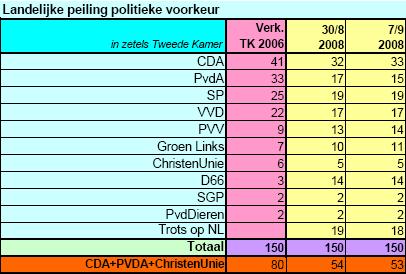Oh dear. The latest opinion polls do not look good for the government parties, with the social democrats in particular polling at a historic low point (link in Dutch/PDF). How did it get to be this way?

Until about 2002 the Dutch political landscape was relatively uncomplicated. Power was shared between the social democrats (PvdA), liberals (VVD/D66) and Christian Democrats (CDA) in various centre right (CDA/VVD) or centre left (PvdA/CDA, PvdA/VVD/D66) coalitions, with a few smaller parties on the fringes for those who chose principles over power. Sure, there were times when several of the big three and a half (D66 being the half) parties were not on speaking terms, but on the whole it was a cozy and mutual profitable consensus. Even the exclusion of the Christian Democrats from power for most of the nineties –something that hadn’t happened before — did not really threaten the system.
But then came Fortuyn and the whole house of cards collapsed. As I explained at the time, Fortuyn’s party won the 2002 general elections through a combination of the voters being sick to the backteeth of the existing parties and their arrogance, the general dire economical and political situation making the party’s populist message attractive and a general wave of sympathy for the murdered Fortuyn. When the party went into government only to crash and burn completely, it looked at first as if the old consensus had re-established itself, but since then we’ve seen the rise of two more would-be Fortuyns, Geert “Islamophobe” Wilders and Rita “talks the talk but does not walk” Verdonk, both coincidently ex-members of the VVD. Especially the rise of Verdonk’s party, Trots op Nederland (Proud of Holland), is remarkable, getting 18 seats without having done anything at all. Verdonk has barely shown her face in parliament, prefering to go on begging tours of the country instead…
To draw longterm conclusions out of one poll is of course silly, but the polls have been trending this way for a year or so now and even if things will shake out differently at election time, it’s still a somewhat worrying development. Not so much the establishment parties losing their traditional voting base –they deserve it– but where those votes are going. Both Wilders and Verdonk play on a nascent xenophobia and Islamophobia that, if not quite unknown before 2001-02, only came into full flower after the September 11 attacks and the murders of Fortuyn and Theo van Gogh. Sentiments that had been taboo for decades (Islam as a violent religion, the need for all foreigners to integrate and learn Dutch, the usual stereotypes about workshy, criminal wifebeating minorities etc) went mainstream, were seriously debated by political commentators who, if pressed, would’ve called themselves leftwing. Don’t take my word for it, The European Commission against Racism and Intolerance said so too, earlier this year.
Meanwhile the options for the real left look bleak. Two years ago it looked likely that we’d see a genuinely leftist government in power, but as per usual the PvdA opted instead for the familiar and went with the Christian Democrats. Now this choice has brought them well deserved ruin, but the votes they lost are not picked up by the only genuinely socialist party in parliament, the SP. Instead the SP is losing the competition with Verdonk and Wilders for the populist vote, as the country is continuing its rightward drift.
In short term then things look bleak, but we shouldn’t panic. The SP needs to keep mounting a strong opposition against both the establishment and the populist right, keep holding to their principles and not go for the easy option of joining in the scaremongering. Currently Wilders and Verdonk are doing well because they don’t have to worry about anything but political point scoring. They’re not in power, they’re focused completely on parliament, not local government and therefore they can be as extreme as they like without suffering the consequences. Like Fortuyn’s party, these movements are likely to splinter once they do have to take on real responsibilities and inevitably have to compromise. Not a reason to be complacent and sit on our hands, but a reminder that things may look bleak now, but they won’t always remain so. The destruction of the old consensus opens opportunities for the left as well as the right.


